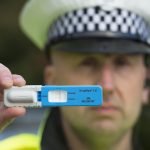

Roadside drug tests introduced

Motorists in Orkney — and across the country — are facing the possibility of roadside drug tests, as Scotland gets tougher on drug driving.
A new law, which introduces strict drug drive limits has come into effect, today, Ocotober 21. Police are now able to carry out immediate tests using “mouth swabs” for any motorist they suspect of drug driving, or who have been involved in a collision or stopped for a traffic offence. According to the Scottish Government, if the test is positive, drivers will be arrested.
According to figures shared by Road Safety Scotland, people are up to three times more likely to be killed or seriously injured in a road crash when driving after taking cannabis — rising to 10 times for cocaine — while combining drugs or combining them with alcohol multiplies your risk of being involved in a crash.
The new law means it is now easier to hold drug drivers to account as there is no requirement to prove that someone was driving in an impaired manner. There is a zero-tolerance approach to the eight drugs most associated with illegal use, including cannabis, heroin and cocaine. Drugs associated with medical use have limits based on impairment and road safety.
Cabinet Secretary for Justice Humza Yousaf said: “Driving a vehicle while under the influence of drugs is simply not acceptable. The consequences of causing a collision while under the influence can be devastating.
“I am grateful to Police Scotland, the Scottish Police Authority, and the Crown Office and Procurator Fiscal Service for their hard work to prepare for the new laws coming into force.
“Alongside our stringent drink driving limits, these new curbs will ensure Scotland’s law enforcement agencies have the most robust powers in the UK to tackle impaired and unsafe driving in order to keep people safe.”
For further information visit: http://www.legislation.gov.uk/ssi/2019/83/contents/made